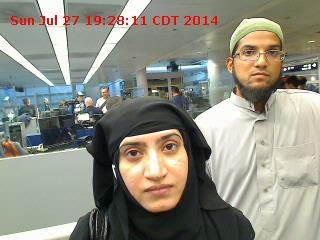
UPDATE: 14:31 p.m. IST -- Apple CEO Tim Cook said the company opposes the order by a U.S. judge to help FBI unlock the iPhone of San Bernardino shooter Syed Farook, in a statement on Wednesday.
"Up to this point, we have done everything that is both within our power and within the law to help them [FBI]. But now the U.S. government has asked us for something we simply do not have, and something we consider too dangerous to create. They have asked us to build a backdoor to the iPhone," Cook said.
Citing the threat to data security, Apple said it was committed to the protection of users' personal information. Cook said that the FBI has asked the company to "make a new version of the iPhone operating system, circumventing several important security features."
"The government is asking Apple to hack our own users and undermine decades of security advancements that protect our customers — including tens of millions of American citizens — from sophisticated hackers and cybercriminals. The same engineers who built strong encryption into the iPhone to protect our users would, ironically, be ordered to weaken those protections and make our users less safe," the Apple CEO said.
Original Story:
Apple Inc. has been ordered to unlock the iPhone 5C belonging to San Bernardino shooter Syed Rizwan Farook so as to help the Federal Bureau of Investigation (FBI) with its investigation of the attack. The order came from a U.S. judge on Tuesday, as investigators are trying to trace the movement of Farook and his wife on the day (Dec. 2, 2015) they shot dead 14 people dead.
Magistrate Judge Sheri Pym of U.S. District Court in Los Angeles asked Apple to provide "reasonable technical assistance" to the FBI that will include disabling its auto-erase function and recovering the iPhone's passcode, according to The Los Angeles Times. If the phone company finds the order "unreasonably burdensome," it should challenge it in five working days, the judge said.
"The government has been unable to complete the search because it cannot access the iPhone's encrypted content. Apple has the exclusive technical means which would assist the government in completing its search, but has declined to provide that assistance voluntarily," the U.S. Attorney's Office in Los Angeles had said in its motion.
However, in a case last year, Apple had reportedly told a court it was "impossible" to unlock phones that had an operating system of iOS 8 or higher. The San Bernardino shooter's phone ran on iOS 9, according to Reuters.
The San Bernardino County Health Department had reportedly given the iPhone 5 to Farook, who used to work there as a health inspector. Farook and his wife Tashfeen Malik had launched an attack on the Inland Regional Center, where several members of the county health department were attending a party.
The two were shot dead hours later, and the FBI has been trying to track the couple's movements on that day. They have been slowed down by a 18-minute "blind spot" in the hours between the shooting incident and the encounter of the couple, and are reportedly checking if they had tried to contact someone in that period.
FBI Director James Comey had told Congress members last week that they have been unable to access the contents of the iPhone belonging to one of the shooters. The FBI reportedly fears that the operating system will destroy data after 10 failed attempts to unlock the phone. The investigators have sought Apple's help in tracking data on Farook's phone after Oct. 19, 2015, the day on which the shooter is believed to have disabled the function of sending backup information to the iCloud server.
The case adds to the growing debate in which security officials say strong encryption by phone companies is impeding criminal investigations, while the latter say that it prevents hacking of personal data.

















